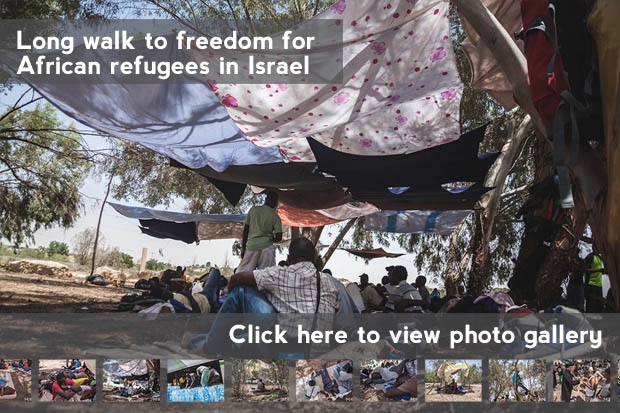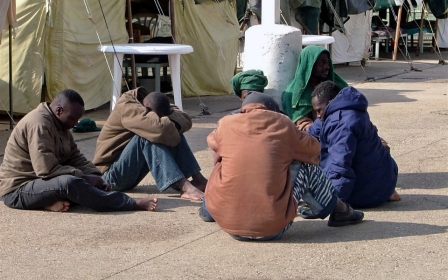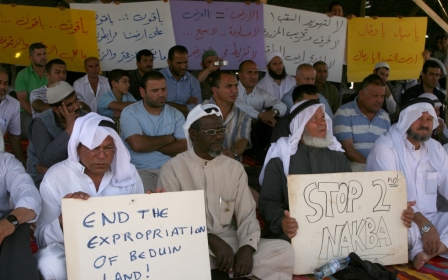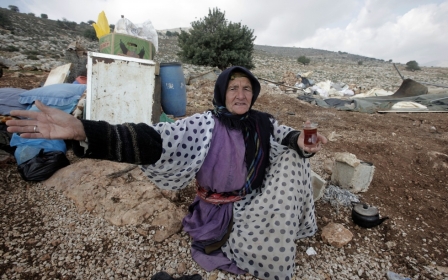Long walk to freedom for African refugees in Israel
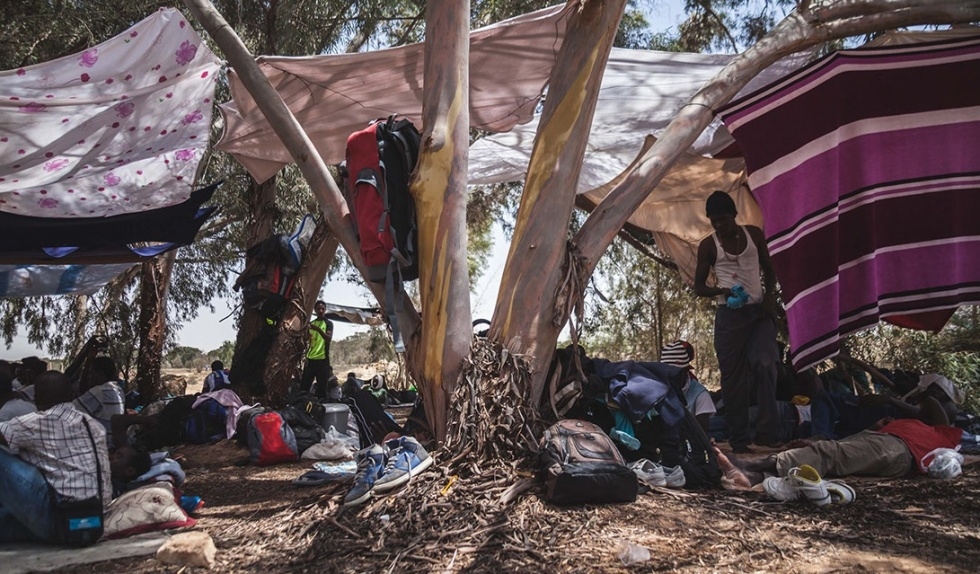
“As long as we are in Israel, we know our fate is in prisons. We don’t want to go back to Israel. We just want any chance possible to get out from Israel.”
Thirty-year-old Jack Adam is just one of a thousand Sudanese and Eritrean refugees, living in Israel illegally, who began a hunger strike late last night after they were evicted from their plot of land just north of the border with Egypt, in the southern Negev desert.
On Friday afternoon, Adam and his fellow refugees stormed out of the Holot Open Detention Centre in Nitzana and headed for the border, demanding it be opened and the authorities allow them to leave Israel.
But they were turned away by military, some of them forcefully, and instead decided to set up camp just beyond the 300-metre clearance line, vowing never to go back to Holot.
One man who Middle East Eye spoke to, Teshome Nega, said even death would be a better option.
“It’s better to be here and die here than be at the detention centre. It’s all the same. It’s much better here to be free at least to talk and move.”
When Middle East Eye visited the campsite, about three hours drive south of Jerusalem, yesterday afternoon, men we spoke to said they wouldn’t give up hope of being able to walk through the gates and leave Israel behind.
But late into the night, police and immigration agents targeted the makeshift tents, violently evicting everyone from the area.
All have been taken to the nearby Saharonim Detention Centre, and some received injuries to their faces and limbs in the process.
Their late-night eviction has now sparked a hunger strike in protest.
Many of the men at the camp have been in Holot’s detention centre since it opened late last year, but they’ve been in Israel much longer, some since 2007.
At first Holot was hailed by Israel authorities for its open-door policy. A road runs along the perimeter of the facility and beyond that, a steel fence with cameras, radars and motion sensors. Residents can leave the site at any time during the day, but must return three times a day to check in, and the gates are locked between 10pm and 6am.
The centre was built after a ruling in September last year by Israel’s Supreme Court that incarcerating migrants without trial for up to three years was unlawful. Instead the court ruled migrants, asylum seekers and refugees already detained in Saharonim Detention Centre and Ktziot Prison should be released within 90 days.
In response, the government passed a law to reduce the period of detention to one year but impose an indefinite period for those within “open” detention centres.
However, refugees MEE spoke to refuse to call it an open detention centre.
“It’s a prison, not a camp … politically they call it a camp, but it’s not. How come that person has no freedom to go out from Holot without signing up three times a day - they’re saying this is camp. How come you don’t have health service or food services or anything?” asks Adam, who has been in Israel almost six years.
He, like so many others, struggled to find work when he arrived in Israel. We hear stories of some refugees sleeping on park benches in Tel Aviv, while trying to find work, while others moved further north to the seaside city of Netanya or south to Eilat in search of general labour jobs.
Twenty-seven-year-old Hassan is from the Darfur region in Sudan and has been helping protesters organise themselves over the weekend. He said the choice to rally against immigration was simple.
“We cannot stay in Holot. Holot is a place which is illegal and we are not criminals. Holot is a prison. A prison is a place for the criminals and that is why we all decided to go to Africa. It doesn’t matter if some people will die or not - regardless of all consequences. “
Hassan told MEE the army stopped them at the border on Friday, and told them they were violating Israel’s laws.
“They told us that instead of offering their security services to civilians, now they’re taking care of us and neglecting their people.
“This is the closest we can get,” referring to the campsite which was set up just 300 metres away from the border.
Break for the border
Everyone’s now in agreement - they want out of Israel. They don’t want to return, despite last night’s eviction. And they’ll continue to fight for their freedom.
Instead they want to be able to leave through the border and enter Egypt.
“I don’t want to stay in Israel anymore, really I don’t want it. We knew Israel would not accept people, whatever. Asylum seekers or refugees or whatever, they will not accept us.
“Egypt’s a better option. In Egypt the regime is not better than Israel, but the United Nations Refugee Agency, UNHCR, is active and visible. But here in Israel, the UNHCR has no power. It could not solve any problems. Why are they here, if they’re not able to solve refugee’s problems? So why shouldn’t they close their office here and go to give their service to any other country?” asks Hassan.
He said they were visited on Saturday by a UNHCR representative who told them he didn’t even have the budget to supply them with some food and water.
Like so many of the refugees, he fears Israel’s method of deportation, saying he is likely to be taken to Uganda.
“I want to go back to Africa, but not by the way the Israeli government wants to take me. They want to put pressure on me and get me to sign unwillingly and throw me in Uganda. And I’m not a Ugandan civilian. After three days, immigration in Uganda would take me to the Government of Sudan and then I don’t know what will happen with me.”
Others are in agreement. Twenty-nine-year-old Danny, who didn’t want his real name used, said he doesn’t want the Israeli government taking care of him, because he’s been here seven years and it hasn’t done anything yet.
“We don’t have any hope from the government.
“Egypt will of course be a better option. In Egypt we might get humanity because the doctors can care about the people. Here in Israel, it’s something very strange, even the doctors don’t care.”
“How do you be racist as a doctor, you have humanitarian concerns?” asked another protester, 27 year-old Ahmed Issa.
Before Issa came to Israel, he thought the country, being a democratic one, would be caring. However, now he knows differently. He’s fed up with the name-calling by the government and by other officials.
They’ve been called “infiltrators” by Prime Minister Benjamin Netanyahu and “a cancer” by others.
“I feel worse for being called this, because human beings have a right to live anywhere. They’re calling us cancer, criminals, giving us the very worse treatment, we can’t stand it. So we don’t want to go back (to Israel), we’re just going to go forward.
“We have been here for seven years, nobody cares, nobody talks to us, they’re just insulting us all the time, we are poor people, we are looking for a place to save us, we need protection,” he said.
Back in 2012, Knesset member Miri Regev said the migrants were a “cancer in the body of the nation” - name-calling designed to incite hatred within the local Israeli population. She later claimed she was referring to how the migrant worker population had spread, nothing else.
Adam said the labels are partly why he desperately wants out.
“We feel totally rejected. We hear they are saying we’re bad people, criminals or baddies, and they don’t like us. That’s why we feel we’re not very accepted. We just have to cross the border and be out of the responsibility of Israel.”
Mutual support
Despite the eviction and lack of political support, the refugees say they’re not giving up hope.
“We have hope it (the border crossing) will happen, we are here and we are happy about it. We are suffering but we have hope,” Danny told MEE.
Walking around the sandy site, hope appeared all around. The camp was full of makeshift tents when MEE visited, made from cloth. People were either sitting around talking and laughing and supporting each other, or laying down trying to get some respite from the 39-degree heat.
Two occasions during our visit sparked some excitement among the refugees – sorting out power cords and who got what cellphone from a tangled bundle of wires on the ground, and later, when a bus-load of water, pitta bread, hummus, coffee and watermelon arrived on site from Tel Aviv.
“We get a lot of support from our brothers in Tel Aviv. We come from the same conditions and now we are in the same situation … and we are from the same culture. So we know how to understand each other and give respect because we take care of each other, because we have no one to take care of us,” said Hassan.
“We’ve been talking to each other and telling people not to lose hope of the gates opening. We talk to each other and tell them life might be difficult but that doesn’t mean people should go and kill themselves. One day we will get a family and a better life. We are human beings and we deserve it.”
Middle East Eye propose une couverture et une analyse indépendantes et incomparables du Moyen-Orient, de l’Afrique du Nord et d’autres régions du monde. Pour en savoir plus sur la reprise de ce contenu et les frais qui s’appliquent, veuillez remplir ce formulaire [en anglais]. Pour en savoir plus sur MEE, cliquez ici [en anglais].


